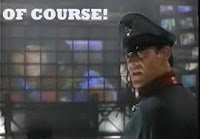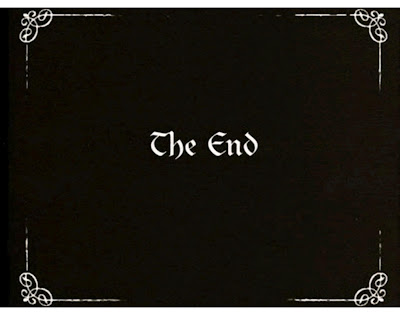 |
| Of Course! |
So years ago I was in a game that our group tracked down this evil lord across the planes and we finally cornered him at his castle. This was our arch nemesis. We had been commissioned by the great god of nature and magic "Joe-bob" to defeat him. We had stopped his army before and now he was in his home consolidating power. He was going to take over the world.
We grouped up in the village outside the castle and I remember the DM asking us "Alright so how are you getting into the castle?"
Get into the castle? So soon? Why would we do that? There is a whole village here to explore and get information about! My character, the alchemist, and his party actually all donned disguises and opened up a small shop selling trinkets. We called it "A-mage-ing stuff'n'things".
So while the DM had prepared for the big invasion that night, ready to end the whole year long campaign that night or the night after: we squeezed out over a month more of plot by finding a balance between running our little shot and slowly undermining and spying on our enemy.
I told one of my friends in college about this and he said something that immediately stuck within my gaming group: "Oh, they went for tacos."
"Went for tacos? What do you mean?"
 |
| ¡Yo Quiero Taco Bell! |
"My players did something like that. I was prepared to get them to do something, they were already seemingly on board and then I said 'Okay guys, lets do this" and one of my players just said "Nope, forget that, instead we are going to Taco bell! Yep we are going to just relax and order some tacos and maybe a few chalupas! And you know what you are going to do, you are going to have ninjas drop down from the ceiling while we are trying to eat. Cause there is no way we should be able to get away with that."
And thus the term "going for tacos" was born. From his group to mine and now to yours!
Some last things to keep in mind
As a DM: Your players will on occasion go out for tacos. This is one of the reasons why I mentioned that you shouldn't over commit your time on specifics for the game. If you want to shy players away from going out for tacos, there is one little trick I found that keeps the players focused: a time limit. Make sure they realize that yes, they are allowed to explore other places, but the clock is ticking. as soon as players feel like they have an actually limited time frame to work in, they can get focused really quickly.
With that said, not shy away from it all the time. As soon as your players roll up their characters, the rp world is not yours alone. If they show interest in something you originally didn't think they would, try your best to roll with it.
With that said, not shy away from it all the time. As soon as your players roll up their characters, the rp world is not yours alone. If they show interest in something you originally didn't think they would, try your best to roll with it.
As a PC: Use tacos sparingly. At best they can be used to explore and expand the game worlds, in new and exciting ways that not even the DM foresaw. To use them this way, latch onto a minor detail that the DM threw to you as flavor, and investigate it further (as our group did with that village).
But just like their name-sake, tacos every time gets old very fast. They are a sometimes food. Your DM does do work to plan things out so make sure to make sure that his preparations are not completely wasted.
But just like their name-sake, tacos every time gets old very fast. They are a sometimes food. Your DM does do work to plan things out so make sure to make sure that his preparations are not completely wasted.
Until next time Facedowners! May you enjoy the delicious taste of tacos while fighting off ninja.
 |
| "You'll take my crunchy tacos over my dead body!" But seriously, NPH is awesome. |





